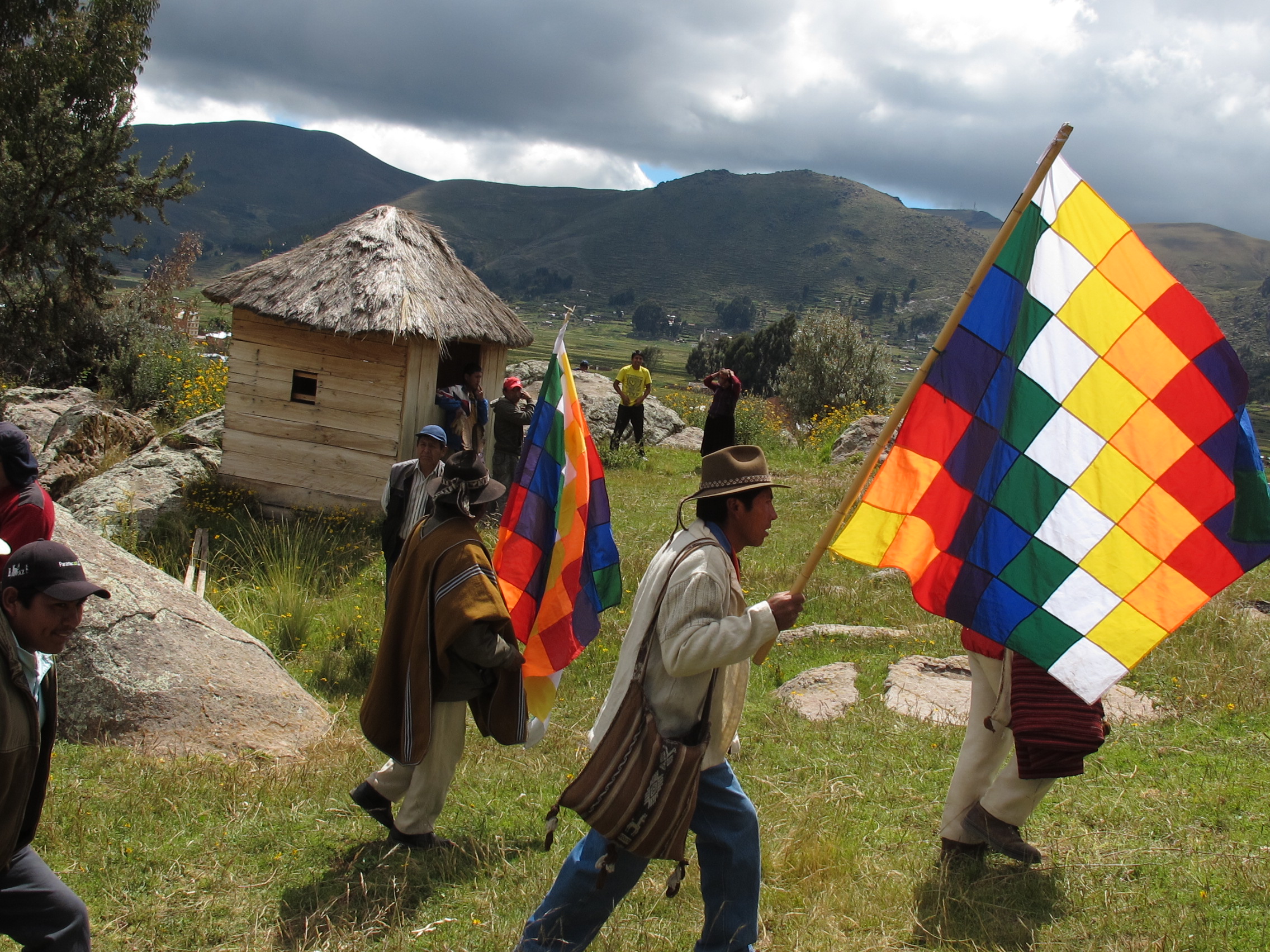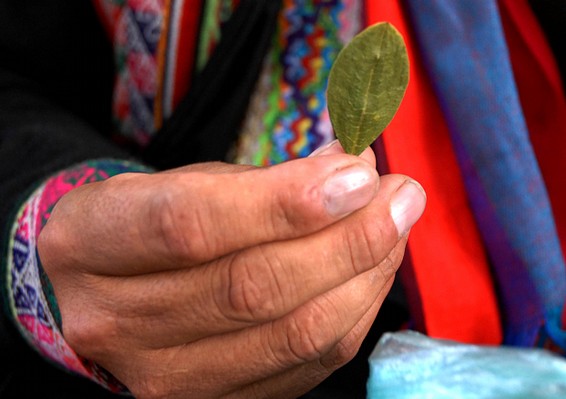|
David Choquehuanca
David Choquehuanca Céspedes (born 7 May 1961) is a Bolivian diplomat, peasant leader, politician, and trade unionist serving as the 39th vice president of Bolivia since 2020. A member of the Movement for Socialism, he previously served as minister of foreign affairs from 2006 to 2017 and as secretary general of ALBA from 2017 to 2019. An ethnic Aymara, Choquehuanca was born in Cota Cota Baja, later completing secondary education in Huarina, where he became an adherent of Marxist thought. He studied philosophy at institutes in La Paz and Havana before joining the indigenous peasant labor movement, during which time he became acquainted with '' cocalero'' activist Evo Morales, with whom he went on to form the Movement for Socialism. Through the late 1990s and early 2000s, Choquehuanca served as a key advisor to indigenous organizations and peasant leaders, including Morales, and was the national coordinator of the Nina Program, an NGO dedicated to training activist leader ... [...More Info...] [...Related Items...] OR: [Wikipedia] [Google] [Baidu] |
Choquehuanca
Choquehuanca is a surname. Notable people with the surname include: *Ana María Choquehuanca (born 1958), Peruvian politician, businesswoman, and economist *David Choquehuanca (born 1961), Bolivian politician {{Short pages monitor ... [...More Info...] [...Related Items...] OR: [Wikipedia] [Google] [Baidu] |
Normal School
A normal school or normal college is an institution created to train teachers by educating them in the norms of pedagogy and curriculum. In the 19th century in the United States, instruction in normal schools was at the high school level, turning out primary school teachers. Most such schools are now called teacher training colleges or teachers' colleges, currently require a high school diploma for entry, and may be part of a comprehensive university. Normal schools in the United States, Canada and Argentina trained teachers for primary schools, while in Europe, the equivalent colleges typically educated teachers for primary schools and later extended their curricula to also cover secondary schools. In 1685, St. Jean-Baptiste de La Salle, founder of the Institute of the Brothers of the Christian Schools, founded what is generally considered the first normal school, the ''École Normale'', in Reims, Champagne, France. The term "normal" in this context refers to the goal of ... [...More Info...] [...Related Items...] OR: [Wikipedia] [Google] [Baidu] |
Non-governmental Organization
A non-governmental organization (NGO) or non-governmental organisation (see American and British English spelling differences#-ise, -ize (-isation, -ization), spelling differences) is an organization that generally is formed independent from government. They are typically nonprofit organization, nonprofit entities, and many of them are active in humanitarianism or the social sciences; they can also include club (organization), clubs and voluntary association, associations that provide services to their members and others. Surveys indicate that NGOs have a high degree of public trust, which can make them a useful proxy for the concerns of society and stakeholders. However, NGOs can also be lobby groups for corporations, such as the World Economic Forum. NGOs are distinguished from International organization, international and intergovernmental organizations (''IOs'') in that the latter are more directly involved with sovereign states and their governments. The term as it is used ... [...More Info...] [...Related Items...] OR: [Wikipedia] [Google] [Baidu] |
Indigenous Peoples In Bolivia
Indigenous peoples in Bolivia, or Native Bolivians, are Bolivian people who are of indigenous ancestry. They constitute anywhere from 40 to 70% of Bolivia's population of 11,306,341, depending on different estimates, and belong to 36 recognized ethnic groups. Aymara and Quechua are the largest groups."Indigenous peoples in Bolivia." ''International Work Group for Indigenous Affairs.'' Retrieved 2 Dec 2013. The geography of Bolivia includes the , the , and the |
Cocalero
Cocaleros are the coca leaf growers of Peru and Bolivia. In response to U.S.-funded attempts to eradicate and fumigate coca crops in the Chapare region of Bolivia, cocaleros joined with other grassroots indigenous organizations in the country, such as unionized mine workers and peasants to contest the government. Evo Morales, who became president of Bolivia in 2006, was a leader of the cocalero movement in that country. The coca plant and the War on Drugs Coca has been cultivated for 8,000 years by indigenous people in the Andes for medicinal and religious reasons. As a stimulant, it is helpful in overcoming altitude sickness in the high Andes, and can be chewed and made into tea. Other medicinal uses include pain relief, staunching blood flow, combating malaria, ulcers, asthma and improving digestion. It is also configured in many religious ceremonies as offerings to Apus, Inti, and the Pachamama and as a method of divination. It was introduced to Europe in the 16th century, ... [...More Info...] [...Related Items...] OR: [Wikipedia] [Google] [Baidu] |
Peasant Movement
A peasant movement is a social movement involved with the agricultural policy, which claims peasants rights. Peasant movements have a long history that can be traced to the numerous peasant uprisings that occurred in various regions of the world throughout human history. Early peasant movements were usually the feudal and semi-feudal societies, and resulted in violent uprisings. More recent movements, fitting the definitions of social movements, are usually much less violent, and their demands are centered on better prices for agricultural produce, better wages and working conditions for the agricultural laborers, and increasing the agricultural production. In Colonial India, the economic policies of European merchants and planters during the period Company rule adversely affected the peasant class, protecting the landlords and money lenders while they exploited the peasants. The peasants rose in revolt against economic on many occasions. The peasants in Bengal formed a trade ... [...More Info...] [...Related Items...] OR: [Wikipedia] [Google] [Baidu] |
Havana
Havana (; Spanish: ''La Habana'' ) is the capital and largest city of Cuba. The heart of the La Habana Province, Havana is the country's main port and commercial center.Cuba ''The World Factbook''. Central Intelligence Agency. The city has a population of 2.3million inhabitants, and it spans a total of – making it the largest city by area, the most populous city, and the List of metropolitan areas in the West Indies, fourth largest metropolitan area in the Caribbean region. The city of Havana was founded by the Spanish Empire, Spanish in the 16th century, it served as a springboard for the Spanish colonization of the Americas, Spanish conquest of the Americas becoming a stopping point for Spanish galleons returning to Spain. ... [...More Info...] [...Related Items...] OR: [Wikipedia] [Google] [Baidu] |
La Paz
La Paz (), officially known as Nuestra Señora de La Paz (Spanish pronunciation: ), is the seat of government of the Plurinational State of Bolivia. With an estimated 816,044 residents as of 2020, La Paz is the third-most populous city in Bolivia. Its metropolitan area, which is formed by La Paz, El Alto, Achocalla, Viacha, and Mecapaca makes up the second most populous urban area in Bolivia, with a population of 2.0 million, after Santa Cruz de la Sierra with a population of 2.3 million. It is also the capital of the La Paz Department. The city, in west-central Bolivia southeast of Lake Titicaca, is set in a canyon created by the Choqueyapu River. It is in a bowl-like depression, part of the Amazon basin, surrounded by the high mountains of the Altiplano. Overlooking the city is the towering, triple-peaked Illimani. Its peaks are always snow-covered and can be seen from many parts of the city. At an elevation of roughly above sea level, La Paz is the highest ... [...More Info...] [...Related Items...] OR: [Wikipedia] [Google] [Baidu] |
Philosophy
Philosophy (from , ) is the systematized study of general and fundamental questions, such as those about existence, reason, Epistemology, knowledge, Ethics, values, Philosophy of mind, mind, and Philosophy of language, language. Such questions are often posed as problems to be studied or resolved. Some sources claim the term was coined by Pythagoras ( BCE), although this theory is disputed by some. Philosophical methodology, Philosophical methods include Socratic questioning, questioning, Socratic method, critical discussion, dialectic, rational argument, and systematic presentation. in . Historically, ''philosophy'' encompassed all bodies of knowledge and a practitioner was known as a ''philosopher''."The English word "philosophy" is first attested to , meaning "knowledge, body of knowledge." "natural philosophy," which began as a discipline in ancient India and Ancient Greece, encompasses astronomy, medicine, and physics. For example, Isaac Newton, Newton's 1687 ''Phil ... [...More Info...] [...Related Items...] OR: [Wikipedia] [Google] [Baidu] |
Marxism
Marxism is a left-wing to far-left method of socioeconomic analysis that uses a materialist interpretation of historical development, better known as historical materialism, to understand class relations and social conflict and a dialectical perspective to view social transformation. It originates from the works of 19th-century German philosophers Karl Marx and Friedrich Engels. As Marxism has developed over time into various branches and schools of thought, no single, definitive Marxist theory exists. In addition to the schools of thought which emphasize or modify elements of classical Marxism, various Marxian concepts have been incorporated and adapted into a diverse array of social theories leading to widely varying conclusions. Alongside Marx's critique of political economy, the defining characteristics of Marxism have often been described using the terms dialectical materialism and historical materialism, though these terms were coined after Marx's death and their tenet ... [...More Info...] [...Related Items...] OR: [Wikipedia] [Google] [Baidu] |
Huarina
Huarina is a location in the La Paz Department in Bolivia. It is the seat of the Huarina Municipality, (Spanish) one of the four municipalities
A municipality is usually a single administrative division having corporate status and powers of self-government or jurisdiction as granted by national and regional laws to which it is subordinate.
The term ''municipality'' may also mean the go ... of the Omasuyos Province. President of Peru [...More Info...] [...Related Items...] OR: [Wikipedia] [Google] [Baidu] |
Secondary Education
Secondary education or post-primary education covers two phases on the International Standard Classification of Education scale. Level 2 or lower secondary education (less commonly junior secondary education) is considered the second and final phase of basic education, and level 3 (upper) secondary education or senior secondary education is the stage before tertiary education. Every country aims to provide basic education, but the systems and terminology remain unique to them. Secondary education typically takes place after six years of primary education and is followed by higher education, vocational education or employment. In most countries secondary education is compulsory, at least until the age of 16. Children typically enter the lower secondary phase around age 12. Compulsory education sometimes extends to age 19. Since 1989, education has been seen as a basic human right for a child; Article 28, of the Convention on the Rights of the Child states that primary educatio ... [...More Info...] [...Related Items...] OR: [Wikipedia] [Google] [Baidu] |








